Analyzing Social Media in Business: A Digital Technology Report
VerifiedAdded on 2022/12/26
|10
|2507
|82
Report
AI Summary
This report provides an overview of the impact of digital technology, specifically social media, on modern business. It details the importance of social media for businesses, its development over time, and the various technological platforms available. The report discusses how businesses use social media for marketing, brand building, and consumer engagement, highlighting its effectiveness as a business tool by forging consumer bonds and tracking social media content. It also relates social media to course content, focusing on employee management and human resource functions. The report further explores the connection between digital technology and management theories, such as Taylor's scientific management, Fayol's administrative management, and Weber's bureaucratic theory, explaining how social media facilitates their implementation. The conclusion emphasizes the necessity of utilizing digital technology for consumer interaction and enhancing overall organizational performance.
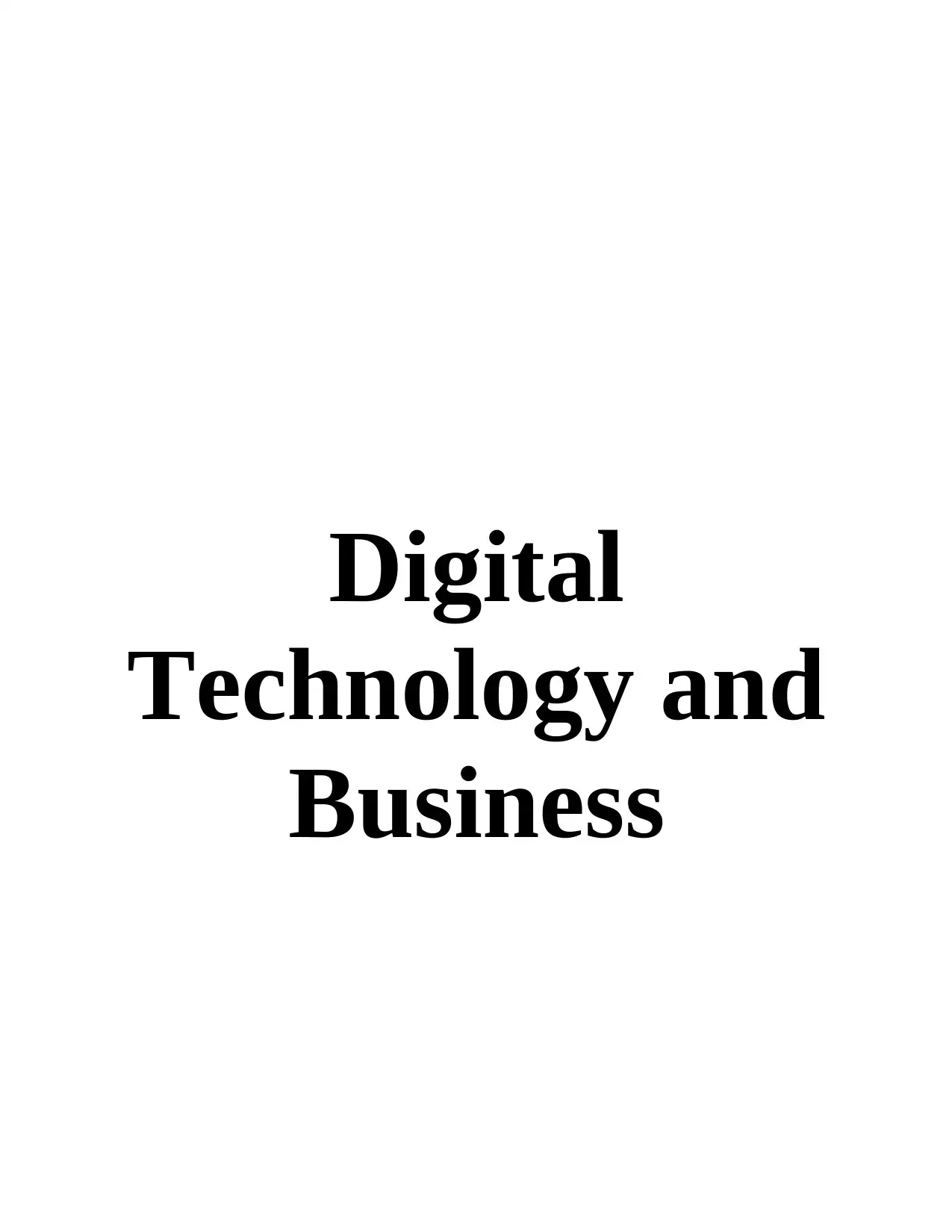
Digital
Technology and
Business
Technology and
Business
Paraphrase This Document
Need a fresh take? Get an instant paraphrase of this document with our AI Paraphraser
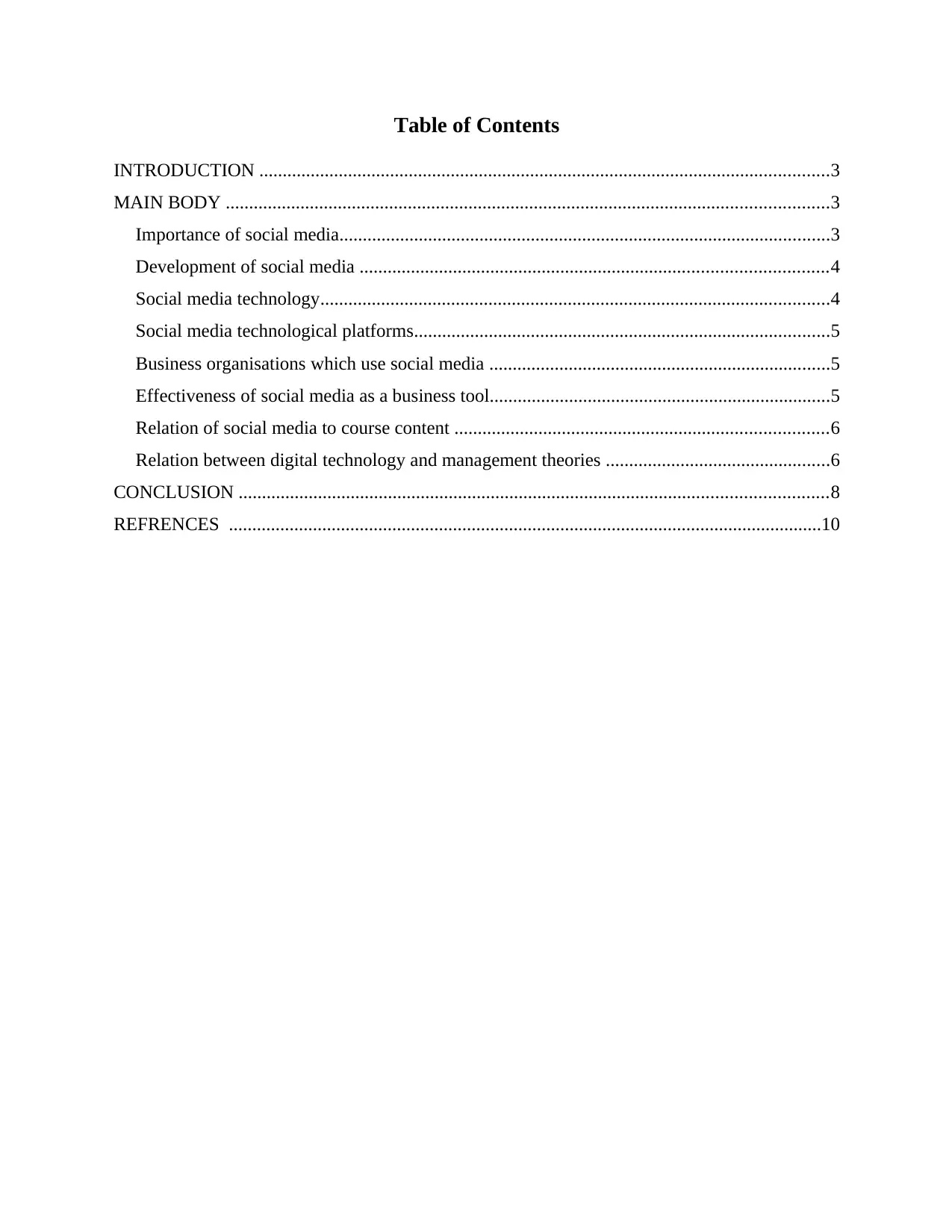
Table of Contents
INTRODUCTION ..........................................................................................................................3
MAIN BODY .................................................................................................................................3
Importance of social media.........................................................................................................3
Development of social media ....................................................................................................4
Social media technology.............................................................................................................4
Social media technological platforms.........................................................................................5
Business organisations which use social media .........................................................................5
Effectiveness of social media as a business tool.........................................................................5
Relation of social media to course content ................................................................................6
Relation between digital technology and management theories ................................................6
CONCLUSION ..............................................................................................................................8
REFRENCES ...............................................................................................................................10
INTRODUCTION ..........................................................................................................................3
MAIN BODY .................................................................................................................................3
Importance of social media.........................................................................................................3
Development of social media ....................................................................................................4
Social media technology.............................................................................................................4
Social media technological platforms.........................................................................................5
Business organisations which use social media .........................................................................5
Effectiveness of social media as a business tool.........................................................................5
Relation of social media to course content ................................................................................6
Relation between digital technology and management theories ................................................6
CONCLUSION ..............................................................................................................................8
REFRENCES ...............................................................................................................................10
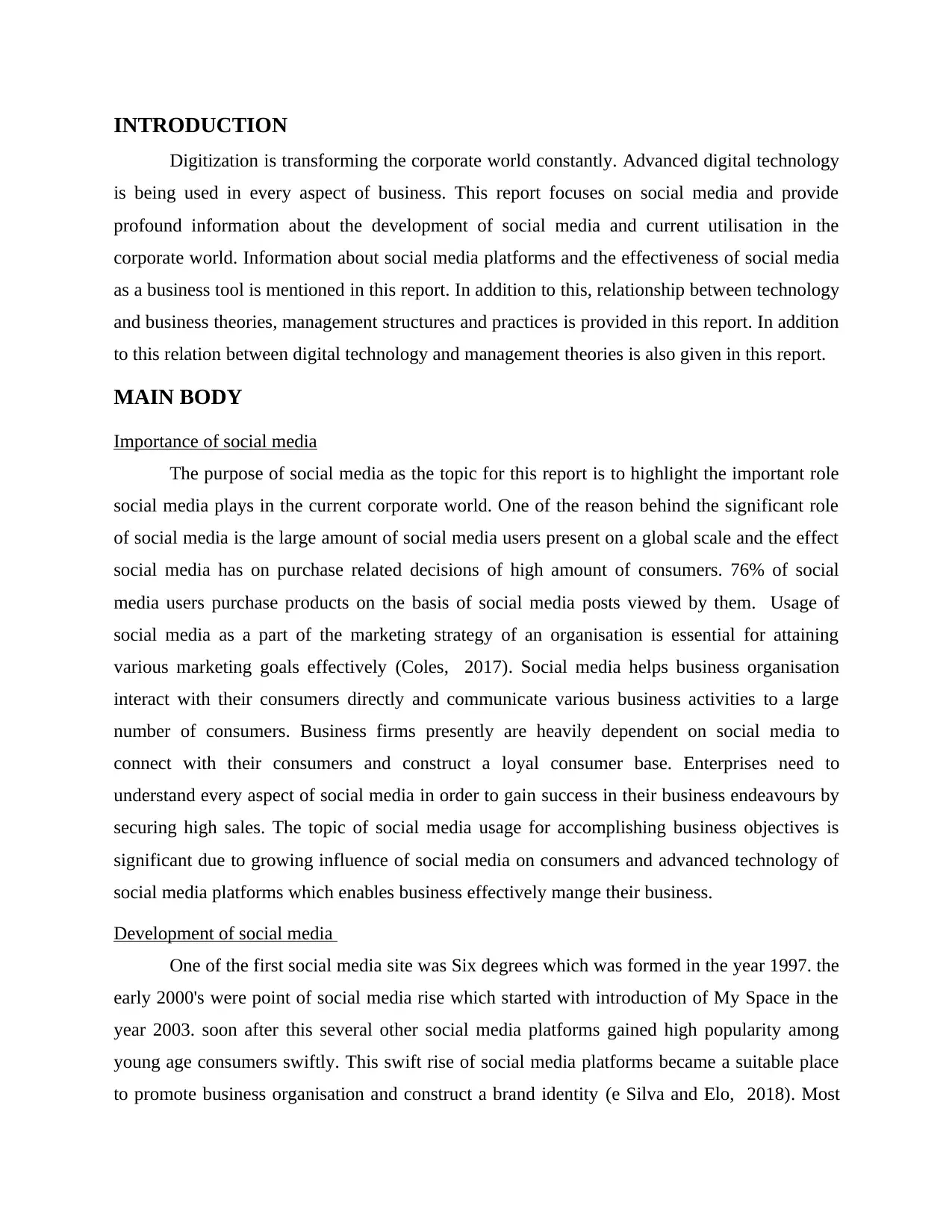
INTRODUCTION
Digitization is transforming the corporate world constantly. Advanced digital technology
is being used in every aspect of business. This report focuses on social media and provide
profound information about the development of social media and current utilisation in the
corporate world. Information about social media platforms and the effectiveness of social media
as a business tool is mentioned in this report. In addition to this, relationship between technology
and business theories, management structures and practices is provided in this report. In addition
to this relation between digital technology and management theories is also given in this report.
MAIN BODY
Importance of social media
The purpose of social media as the topic for this report is to highlight the important role
social media plays in the current corporate world. One of the reason behind the significant role
of social media is the large amount of social media users present on a global scale and the effect
social media has on purchase related decisions of high amount of consumers. 76% of social
media users purchase products on the basis of social media posts viewed by them. Usage of
social media as a part of the marketing strategy of an organisation is essential for attaining
various marketing goals effectively (Coles, 2017). Social media helps business organisation
interact with their consumers directly and communicate various business activities to a large
number of consumers. Business firms presently are heavily dependent on social media to
connect with their consumers and construct a loyal consumer base. Enterprises need to
understand every aspect of social media in order to gain success in their business endeavours by
securing high sales. The topic of social media usage for accomplishing business objectives is
significant due to growing influence of social media on consumers and advanced technology of
social media platforms which enables business effectively mange their business.
Development of social media
One of the first social media site was Six degrees which was formed in the year 1997. the
early 2000's were point of social media rise which started with introduction of My Space in the
year 2003. soon after this several other social media platforms gained high popularity among
young age consumers swiftly. This swift rise of social media platforms became a suitable place
to promote business organisation and construct a brand identity (e Silva and Elo, 2018). Most
Digitization is transforming the corporate world constantly. Advanced digital technology
is being used in every aspect of business. This report focuses on social media and provide
profound information about the development of social media and current utilisation in the
corporate world. Information about social media platforms and the effectiveness of social media
as a business tool is mentioned in this report. In addition to this, relationship between technology
and business theories, management structures and practices is provided in this report. In addition
to this relation between digital technology and management theories is also given in this report.
MAIN BODY
Importance of social media
The purpose of social media as the topic for this report is to highlight the important role
social media plays in the current corporate world. One of the reason behind the significant role
of social media is the large amount of social media users present on a global scale and the effect
social media has on purchase related decisions of high amount of consumers. 76% of social
media users purchase products on the basis of social media posts viewed by them. Usage of
social media as a part of the marketing strategy of an organisation is essential for attaining
various marketing goals effectively (Coles, 2017). Social media helps business organisation
interact with their consumers directly and communicate various business activities to a large
number of consumers. Business firms presently are heavily dependent on social media to
connect with their consumers and construct a loyal consumer base. Enterprises need to
understand every aspect of social media in order to gain success in their business endeavours by
securing high sales. The topic of social media usage for accomplishing business objectives is
significant due to growing influence of social media on consumers and advanced technology of
social media platforms which enables business effectively mange their business.
Development of social media
One of the first social media site was Six degrees which was formed in the year 1997. the
early 2000's were point of social media rise which started with introduction of My Space in the
year 2003. soon after this several other social media platforms gained high popularity among
young age consumers swiftly. This swift rise of social media platforms became a suitable place
to promote business organisation and construct a brand identity (e Silva and Elo, 2018). Most
⊘ This is a preview!⊘
Do you want full access?
Subscribe today to unlock all pages.

Trusted by 1+ million students worldwide
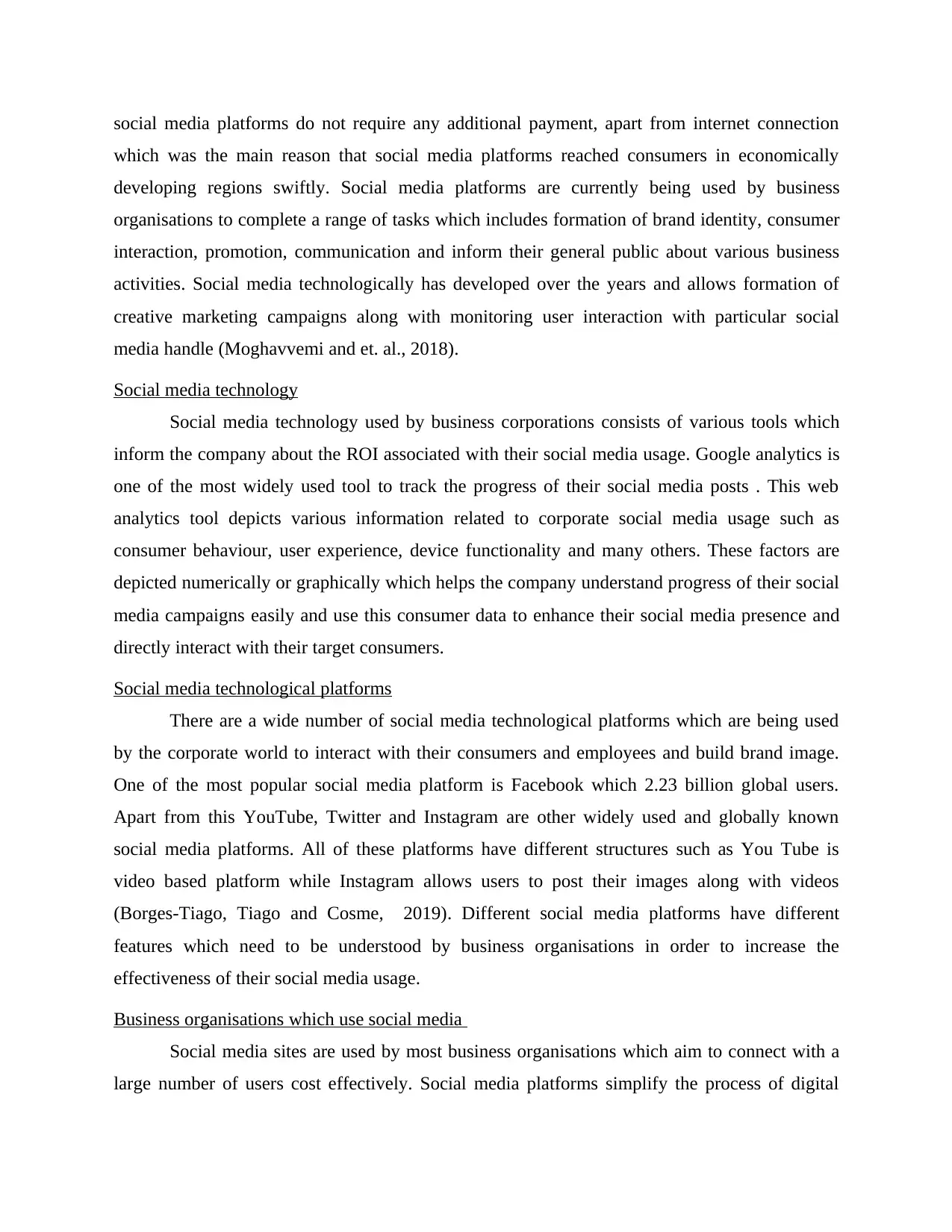
social media platforms do not require any additional payment, apart from internet connection
which was the main reason that social media platforms reached consumers in economically
developing regions swiftly. Social media platforms are currently being used by business
organisations to complete a range of tasks which includes formation of brand identity, consumer
interaction, promotion, communication and inform their general public about various business
activities. Social media technologically has developed over the years and allows formation of
creative marketing campaigns along with monitoring user interaction with particular social
media handle (Moghavvemi and et. al., 2018).
Social media technology
Social media technology used by business corporations consists of various tools which
inform the company about the ROI associated with their social media usage. Google analytics is
one of the most widely used tool to track the progress of their social media posts . This web
analytics tool depicts various information related to corporate social media usage such as
consumer behaviour, user experience, device functionality and many others. These factors are
depicted numerically or graphically which helps the company understand progress of their social
media campaigns easily and use this consumer data to enhance their social media presence and
directly interact with their target consumers.
Social media technological platforms
There are a wide number of social media technological platforms which are being used
by the corporate world to interact with their consumers and employees and build brand image.
One of the most popular social media platform is Facebook which 2.23 billion global users.
Apart from this YouTube, Twitter and Instagram are other widely used and globally known
social media platforms. All of these platforms have different structures such as You Tube is
video based platform while Instagram allows users to post their images along with videos
(Borges-Tiago, Tiago and Cosme, 2019). Different social media platforms have different
features which need to be understood by business organisations in order to increase the
effectiveness of their social media usage.
Business organisations which use social media
Social media sites are used by most business organisations which aim to connect with a
large number of users cost effectively. Social media platforms simplify the process of digital
which was the main reason that social media platforms reached consumers in economically
developing regions swiftly. Social media platforms are currently being used by business
organisations to complete a range of tasks which includes formation of brand identity, consumer
interaction, promotion, communication and inform their general public about various business
activities. Social media technologically has developed over the years and allows formation of
creative marketing campaigns along with monitoring user interaction with particular social
media handle (Moghavvemi and et. al., 2018).
Social media technology
Social media technology used by business corporations consists of various tools which
inform the company about the ROI associated with their social media usage. Google analytics is
one of the most widely used tool to track the progress of their social media posts . This web
analytics tool depicts various information related to corporate social media usage such as
consumer behaviour, user experience, device functionality and many others. These factors are
depicted numerically or graphically which helps the company understand progress of their social
media campaigns easily and use this consumer data to enhance their social media presence and
directly interact with their target consumers.
Social media technological platforms
There are a wide number of social media technological platforms which are being used
by the corporate world to interact with their consumers and employees and build brand image.
One of the most popular social media platform is Facebook which 2.23 billion global users.
Apart from this YouTube, Twitter and Instagram are other widely used and globally known
social media platforms. All of these platforms have different structures such as You Tube is
video based platform while Instagram allows users to post their images along with videos
(Borges-Tiago, Tiago and Cosme, 2019). Different social media platforms have different
features which need to be understood by business organisations in order to increase the
effectiveness of their social media usage.
Business organisations which use social media
Social media sites are used by most business organisations which aim to connect with a
large number of users cost effectively. Social media platforms simplify the process of digital
Paraphrase This Document
Need a fresh take? Get an instant paraphrase of this document with our AI Paraphraser
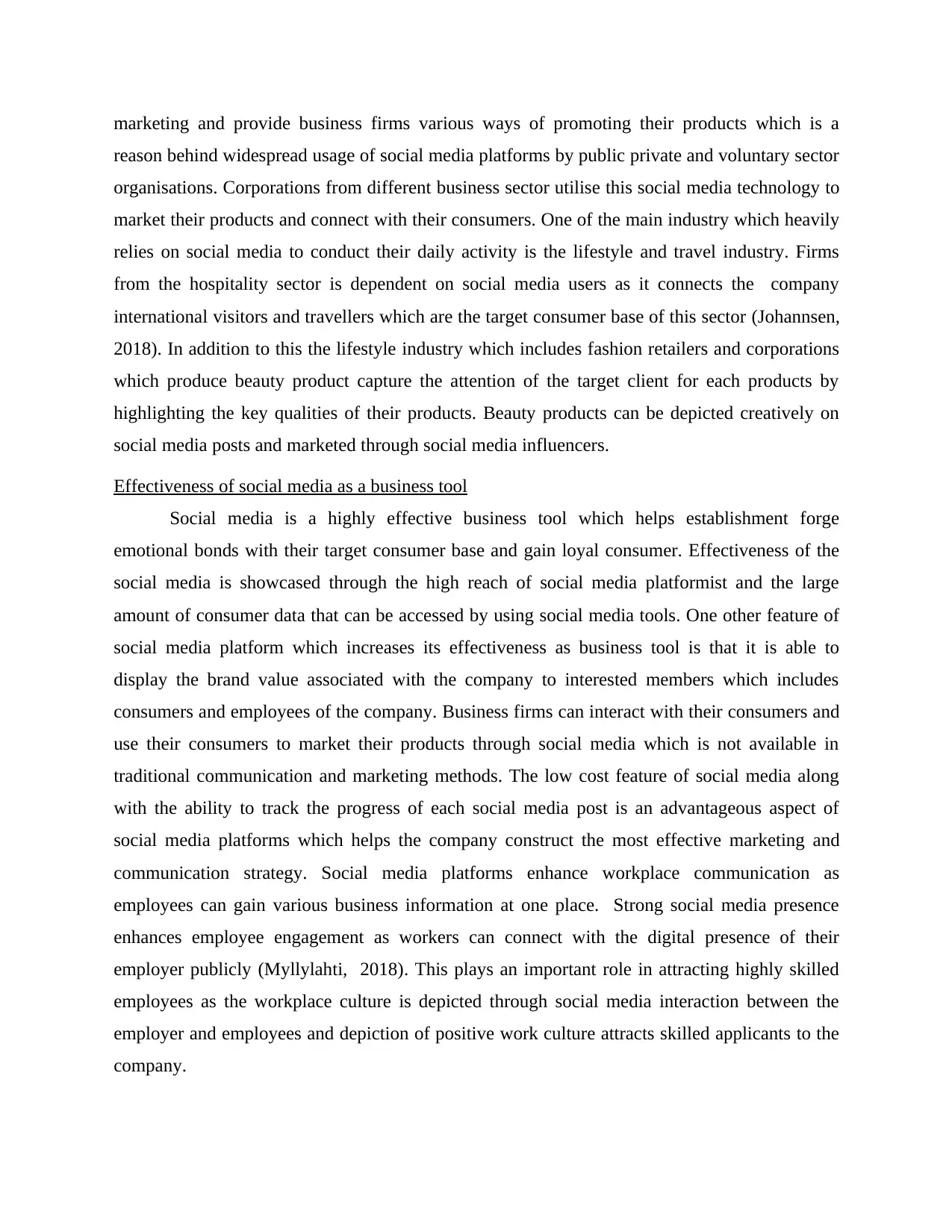
marketing and provide business firms various ways of promoting their products which is a
reason behind widespread usage of social media platforms by public private and voluntary sector
organisations. Corporations from different business sector utilise this social media technology to
market their products and connect with their consumers. One of the main industry which heavily
relies on social media to conduct their daily activity is the lifestyle and travel industry. Firms
from the hospitality sector is dependent on social media users as it connects the company
international visitors and travellers which are the target consumer base of this sector (Johannsen,
2018). In addition to this the lifestyle industry which includes fashion retailers and corporations
which produce beauty product capture the attention of the target client for each products by
highlighting the key qualities of their products. Beauty products can be depicted creatively on
social media posts and marketed through social media influencers.
Effectiveness of social media as a business tool
Social media is a highly effective business tool which helps establishment forge
emotional bonds with their target consumer base and gain loyal consumer. Effectiveness of the
social media is showcased through the high reach of social media platformist and the large
amount of consumer data that can be accessed by using social media tools. One other feature of
social media platform which increases its effectiveness as business tool is that it is able to
display the brand value associated with the company to interested members which includes
consumers and employees of the company. Business firms can interact with their consumers and
use their consumers to market their products through social media which is not available in
traditional communication and marketing methods. The low cost feature of social media along
with the ability to track the progress of each social media post is an advantageous aspect of
social media platforms which helps the company construct the most effective marketing and
communication strategy. Social media platforms enhance workplace communication as
employees can gain various business information at one place. Strong social media presence
enhances employee engagement as workers can connect with the digital presence of their
employer publicly (Myllylahti, 2018). This plays an important role in attracting highly skilled
employees as the workplace culture is depicted through social media interaction between the
employer and employees and depiction of positive work culture attracts skilled applicants to the
company.
reason behind widespread usage of social media platforms by public private and voluntary sector
organisations. Corporations from different business sector utilise this social media technology to
market their products and connect with their consumers. One of the main industry which heavily
relies on social media to conduct their daily activity is the lifestyle and travel industry. Firms
from the hospitality sector is dependent on social media users as it connects the company
international visitors and travellers which are the target consumer base of this sector (Johannsen,
2018). In addition to this the lifestyle industry which includes fashion retailers and corporations
which produce beauty product capture the attention of the target client for each products by
highlighting the key qualities of their products. Beauty products can be depicted creatively on
social media posts and marketed through social media influencers.
Effectiveness of social media as a business tool
Social media is a highly effective business tool which helps establishment forge
emotional bonds with their target consumer base and gain loyal consumer. Effectiveness of the
social media is showcased through the high reach of social media platformist and the large
amount of consumer data that can be accessed by using social media tools. One other feature of
social media platform which increases its effectiveness as business tool is that it is able to
display the brand value associated with the company to interested members which includes
consumers and employees of the company. Business firms can interact with their consumers and
use their consumers to market their products through social media which is not available in
traditional communication and marketing methods. The low cost feature of social media along
with the ability to track the progress of each social media post is an advantageous aspect of
social media platforms which helps the company construct the most effective marketing and
communication strategy. Social media platforms enhance workplace communication as
employees can gain various business information at one place. Strong social media presence
enhances employee engagement as workers can connect with the digital presence of their
employer publicly (Myllylahti, 2018). This plays an important role in attracting highly skilled
employees as the workplace culture is depicted through social media interaction between the
employer and employees and depiction of positive work culture attracts skilled applicants to the
company.
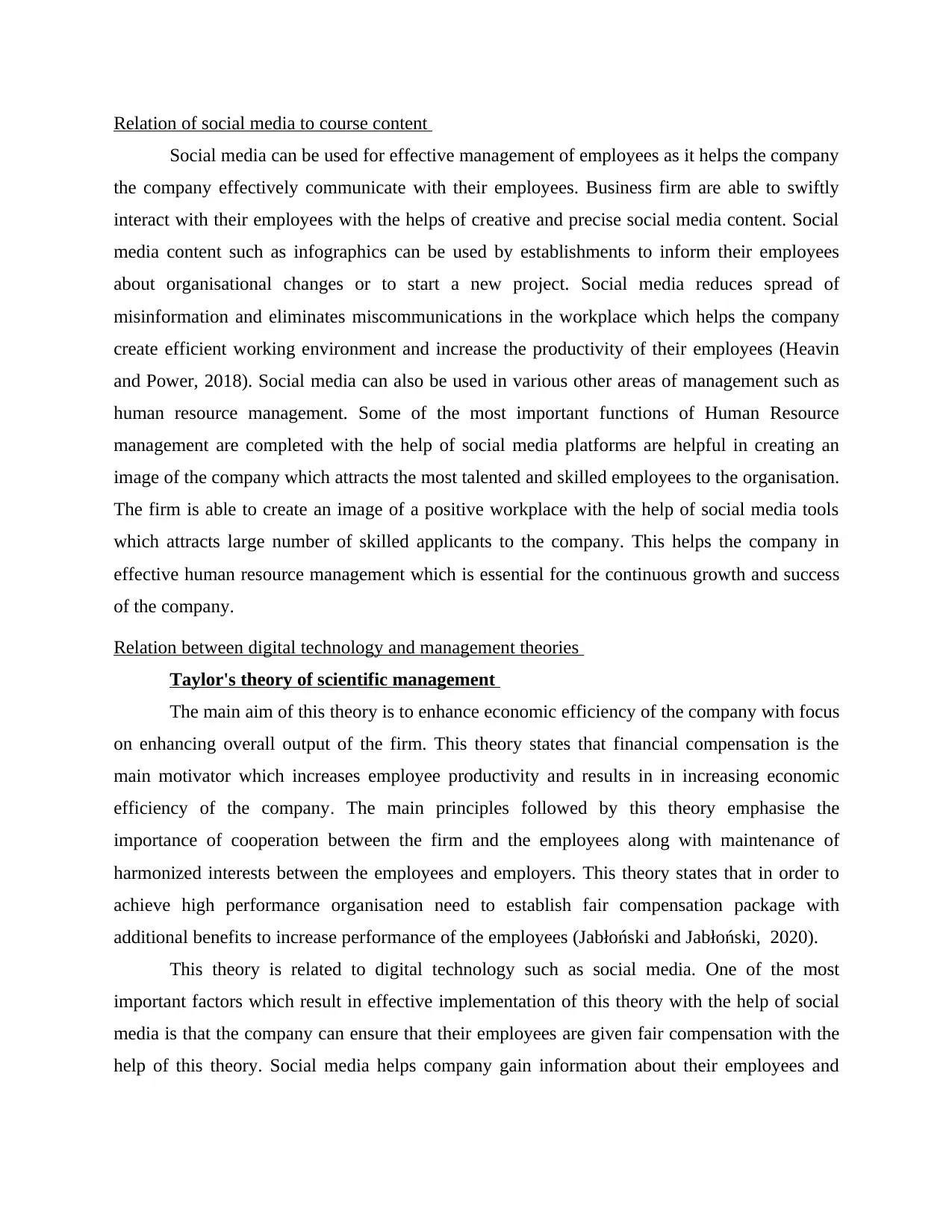
Relation of social media to course content
Social media can be used for effective management of employees as it helps the company
the company effectively communicate with their employees. Business firm are able to swiftly
interact with their employees with the helps of creative and precise social media content. Social
media content such as infographics can be used by establishments to inform their employees
about organisational changes or to start a new project. Social media reduces spread of
misinformation and eliminates miscommunications in the workplace which helps the company
create efficient working environment and increase the productivity of their employees (Heavin
and Power, 2018). Social media can also be used in various other areas of management such as
human resource management. Some of the most important functions of Human Resource
management are completed with the help of social media platforms are helpful in creating an
image of the company which attracts the most talented and skilled employees to the organisation.
The firm is able to create an image of a positive workplace with the help of social media tools
which attracts large number of skilled applicants to the company. This helps the company in
effective human resource management which is essential for the continuous growth and success
of the company.
Relation between digital technology and management theories
Taylor's theory of scientific management
The main aim of this theory is to enhance economic efficiency of the company with focus
on enhancing overall output of the firm. This theory states that financial compensation is the
main motivator which increases employee productivity and results in in increasing economic
efficiency of the company. The main principles followed by this theory emphasise the
importance of cooperation between the firm and the employees along with maintenance of
harmonized interests between the employees and employers. This theory states that in order to
achieve high performance organisation need to establish fair compensation package with
additional benefits to increase performance of the employees (Jabłoński and Jabłoński, 2020).
This theory is related to digital technology such as social media. One of the most
important factors which result in effective implementation of this theory with the help of social
media is that the company can ensure that their employees are given fair compensation with the
help of this theory. Social media helps company gain information about their employees and
Social media can be used for effective management of employees as it helps the company
the company effectively communicate with their employees. Business firm are able to swiftly
interact with their employees with the helps of creative and precise social media content. Social
media content such as infographics can be used by establishments to inform their employees
about organisational changes or to start a new project. Social media reduces spread of
misinformation and eliminates miscommunications in the workplace which helps the company
create efficient working environment and increase the productivity of their employees (Heavin
and Power, 2018). Social media can also be used in various other areas of management such as
human resource management. Some of the most important functions of Human Resource
management are completed with the help of social media platforms are helpful in creating an
image of the company which attracts the most talented and skilled employees to the organisation.
The firm is able to create an image of a positive workplace with the help of social media tools
which attracts large number of skilled applicants to the company. This helps the company in
effective human resource management which is essential for the continuous growth and success
of the company.
Relation between digital technology and management theories
Taylor's theory of scientific management
The main aim of this theory is to enhance economic efficiency of the company with focus
on enhancing overall output of the firm. This theory states that financial compensation is the
main motivator which increases employee productivity and results in in increasing economic
efficiency of the company. The main principles followed by this theory emphasise the
importance of cooperation between the firm and the employees along with maintenance of
harmonized interests between the employees and employers. This theory states that in order to
achieve high performance organisation need to establish fair compensation package with
additional benefits to increase performance of the employees (Jabłoński and Jabłoński, 2020).
This theory is related to digital technology such as social media. One of the most
important factors which result in effective implementation of this theory with the help of social
media is that the company can ensure that their employees are given fair compensation with the
help of this theory. Social media helps company gain information about their employees and
⊘ This is a preview!⊘
Do you want full access?
Subscribe today to unlock all pages.

Trusted by 1+ million students worldwide
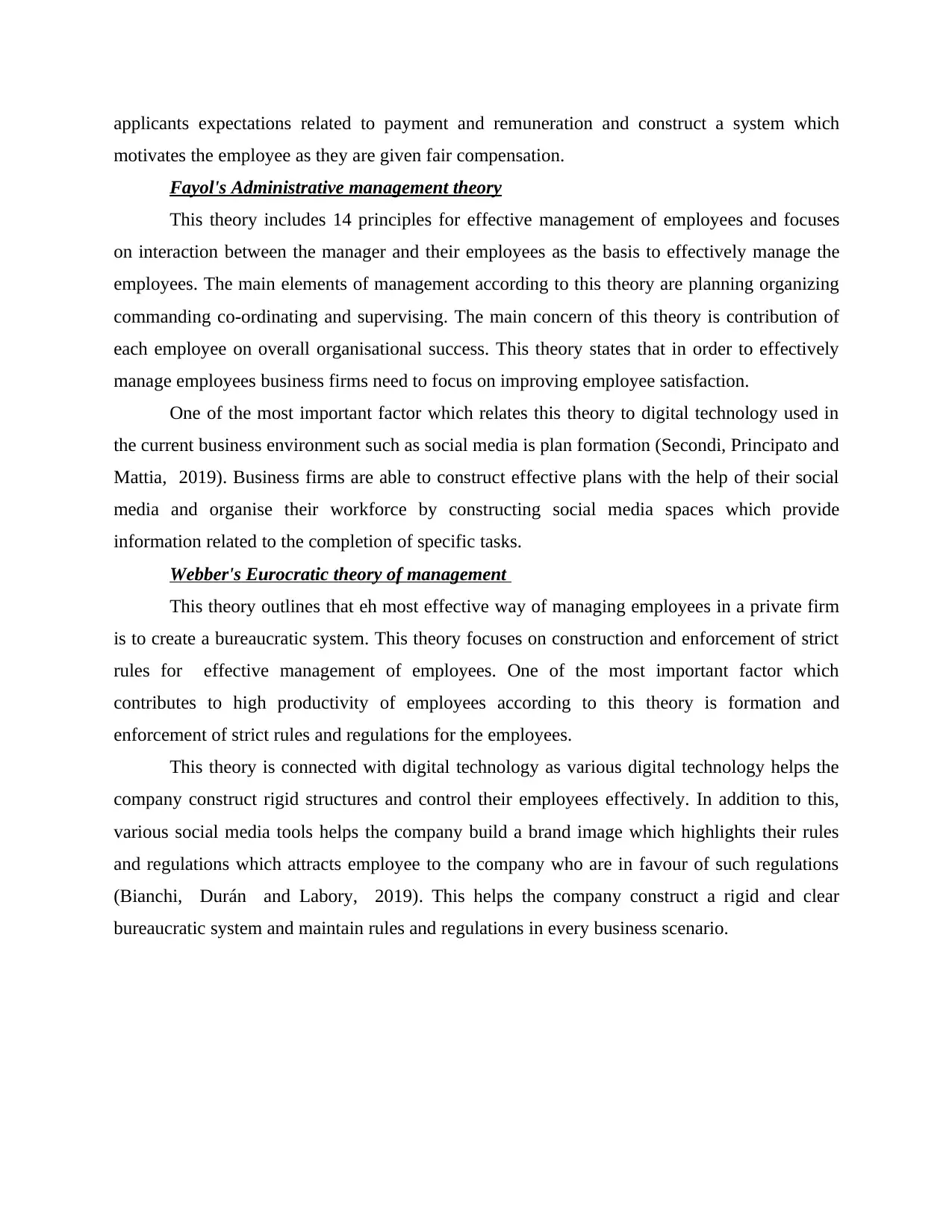
applicants expectations related to payment and remuneration and construct a system which
motivates the employee as they are given fair compensation.
Fayol's Administrative management theory
This theory includes 14 principles for effective management of employees and focuses
on interaction between the manager and their employees as the basis to effectively manage the
employees. The main elements of management according to this theory are planning organizing
commanding co-ordinating and supervising. The main concern of this theory is contribution of
each employee on overall organisational success. This theory states that in order to effectively
manage employees business firms need to focus on improving employee satisfaction.
One of the most important factor which relates this theory to digital technology used in
the current business environment such as social media is plan formation (Secondi, Principato and
Mattia, 2019). Business firms are able to construct effective plans with the help of their social
media and organise their workforce by constructing social media spaces which provide
information related to the completion of specific tasks.
Webber's Eurocratic theory of management
This theory outlines that eh most effective way of managing employees in a private firm
is to create a bureaucratic system. This theory focuses on construction and enforcement of strict
rules for effective management of employees. One of the most important factor which
contributes to high productivity of employees according to this theory is formation and
enforcement of strict rules and regulations for the employees.
This theory is connected with digital technology as various digital technology helps the
company construct rigid structures and control their employees effectively. In addition to this,
various social media tools helps the company build a brand image which highlights their rules
and regulations which attracts employee to the company who are in favour of such regulations
(Bianchi, Durán and Labory, 2019). This helps the company construct a rigid and clear
bureaucratic system and maintain rules and regulations in every business scenario.
motivates the employee as they are given fair compensation.
Fayol's Administrative management theory
This theory includes 14 principles for effective management of employees and focuses
on interaction between the manager and their employees as the basis to effectively manage the
employees. The main elements of management according to this theory are planning organizing
commanding co-ordinating and supervising. The main concern of this theory is contribution of
each employee on overall organisational success. This theory states that in order to effectively
manage employees business firms need to focus on improving employee satisfaction.
One of the most important factor which relates this theory to digital technology used in
the current business environment such as social media is plan formation (Secondi, Principato and
Mattia, 2019). Business firms are able to construct effective plans with the help of their social
media and organise their workforce by constructing social media spaces which provide
information related to the completion of specific tasks.
Webber's Eurocratic theory of management
This theory outlines that eh most effective way of managing employees in a private firm
is to create a bureaucratic system. This theory focuses on construction and enforcement of strict
rules for effective management of employees. One of the most important factor which
contributes to high productivity of employees according to this theory is formation and
enforcement of strict rules and regulations for the employees.
This theory is connected with digital technology as various digital technology helps the
company construct rigid structures and control their employees effectively. In addition to this,
various social media tools helps the company build a brand image which highlights their rules
and regulations which attracts employee to the company who are in favour of such regulations
(Bianchi, Durán and Labory, 2019). This helps the company construct a rigid and clear
bureaucratic system and maintain rules and regulations in every business scenario.
Paraphrase This Document
Need a fresh take? Get an instant paraphrase of this document with our AI Paraphraser
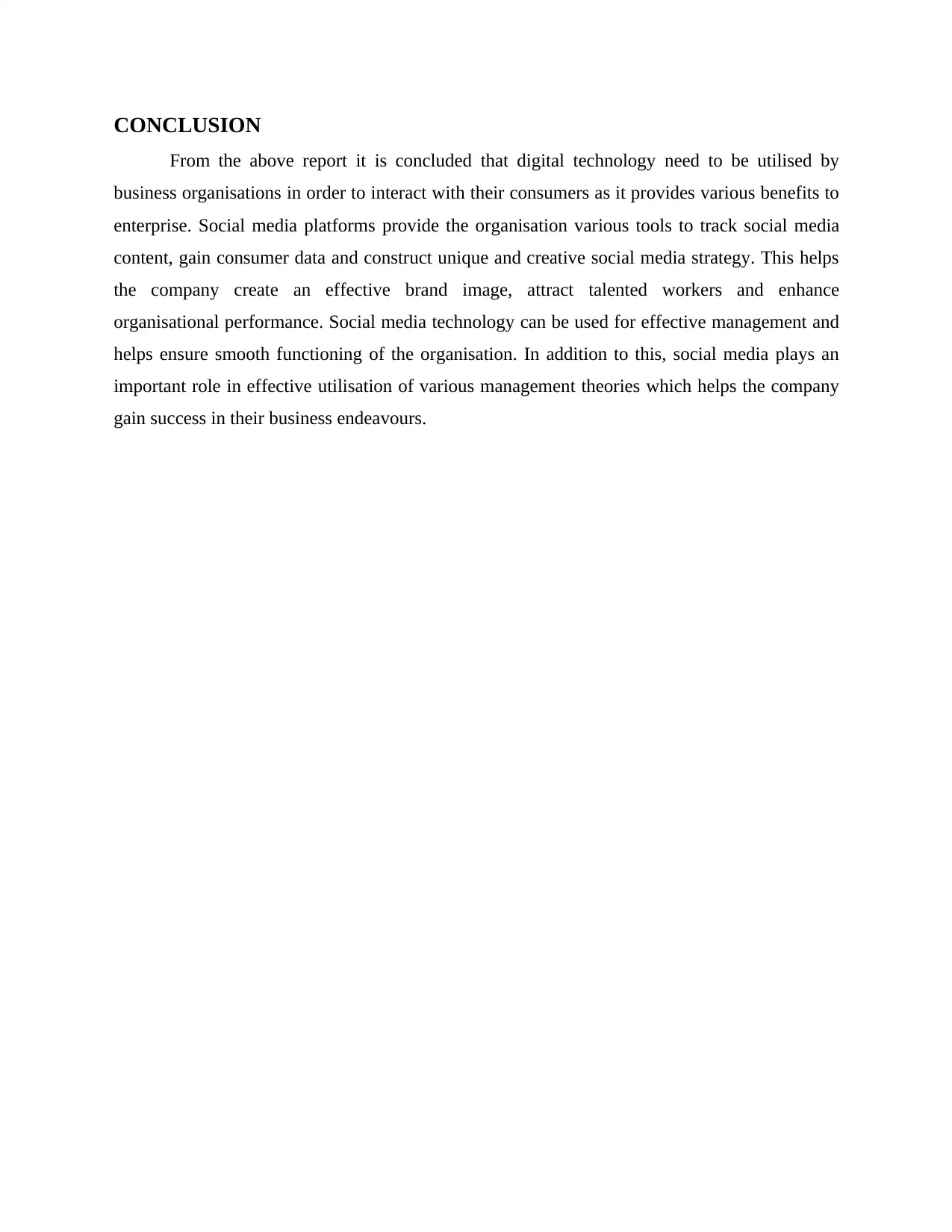
CONCLUSION
From the above report it is concluded that digital technology need to be utilised by
business organisations in order to interact with their consumers as it provides various benefits to
enterprise. Social media platforms provide the organisation various tools to track social media
content, gain consumer data and construct unique and creative social media strategy. This helps
the company create an effective brand image, attract talented workers and enhance
organisational performance. Social media technology can be used for effective management and
helps ensure smooth functioning of the organisation. In addition to this, social media plays an
important role in effective utilisation of various management theories which helps the company
gain success in their business endeavours.
From the above report it is concluded that digital technology need to be utilised by
business organisations in order to interact with their consumers as it provides various benefits to
enterprise. Social media platforms provide the organisation various tools to track social media
content, gain consumer data and construct unique and creative social media strategy. This helps
the company create an effective brand image, attract talented workers and enhance
organisational performance. Social media technology can be used for effective management and
helps ensure smooth functioning of the organisation. In addition to this, social media plays an
important role in effective utilisation of various management theories which helps the company
gain success in their business endeavours.

⊘ This is a preview!⊘
Do you want full access?
Subscribe today to unlock all pages.

Trusted by 1+ million students worldwide
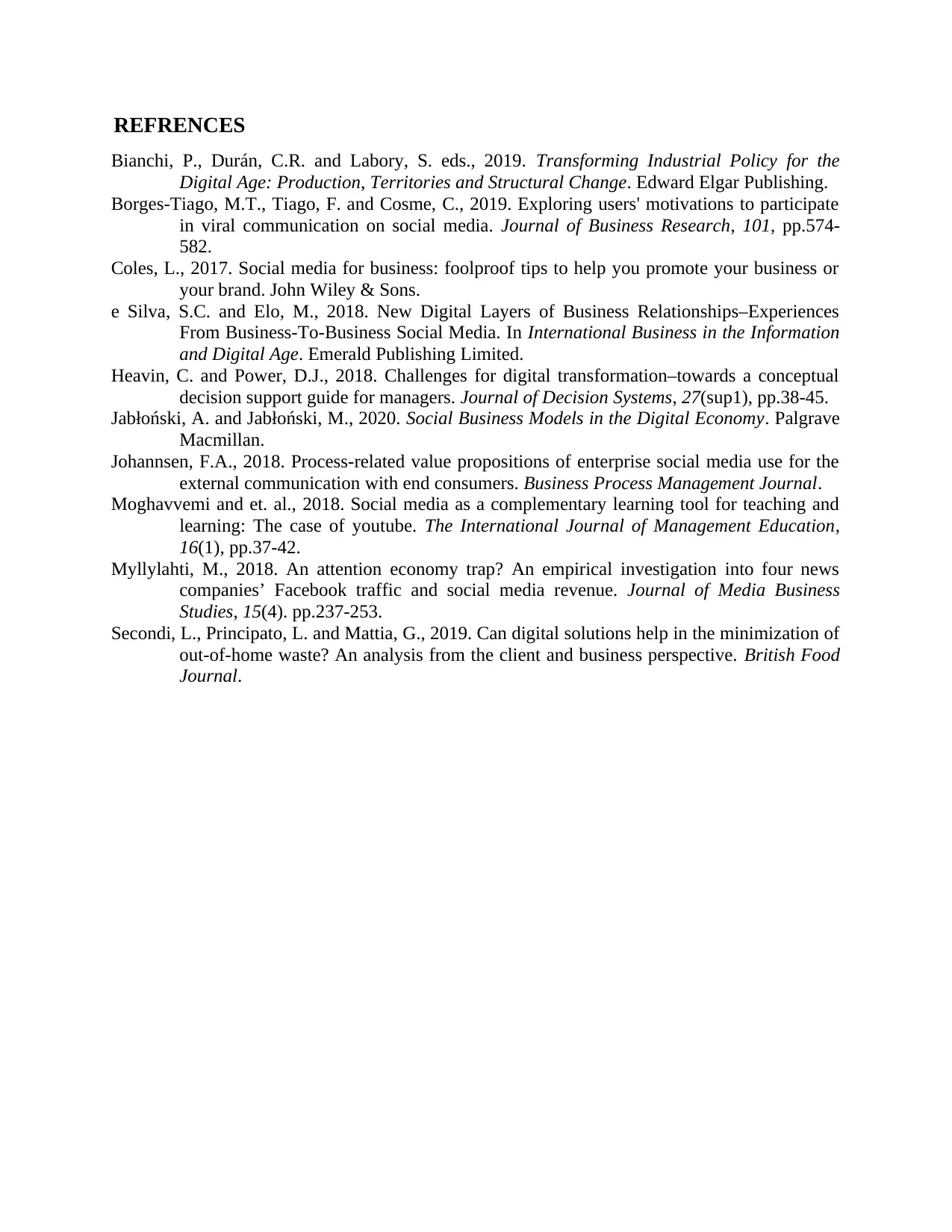
REFRENCES
Bianchi, P., Durán, C.R. and Labory, S. eds., 2019. Transforming Industrial Policy for the
Digital Age: Production, Territories and Structural Change. Edward Elgar Publishing.
Borges-Tiago, M.T., Tiago, F. and Cosme, C., 2019. Exploring users' motivations to participate
in viral communication on social media. Journal of Business Research, 101, pp.574-
582.
Coles, L., 2017. Social media for business: foolproof tips to help you promote your business or
your brand. John Wiley & Sons.
e Silva, S.C. and Elo, M., 2018. New Digital Layers of Business Relationships–Experiences
From Business-To-Business Social Media. In International Business in the Information
and Digital Age. Emerald Publishing Limited.
Heavin, C. and Power, D.J., 2018. Challenges for digital transformation–towards a conceptual
decision support guide for managers. Journal of Decision Systems, 27(sup1), pp.38-45.
Jabłoński, A. and Jabłoński, M., 2020. Social Business Models in the Digital Economy. Palgrave
Macmillan.
Johannsen, F.A., 2018. Process-related value propositions of enterprise social media use for the
external communication with end consumers. Business Process Management Journal.
Moghavvemi and et. al., 2018. Social media as a complementary learning tool for teaching and
learning: The case of youtube. The International Journal of Management Education,
16(1), pp.37-42.
Myllylahti, M., 2018. An attention economy trap? An empirical investigation into four news
companies’ Facebook traffic and social media revenue. Journal of Media Business
Studies, 15(4). pp.237-253.
Secondi, L., Principato, L. and Mattia, G., 2019. Can digital solutions help in the minimization of
out-of-home waste? An analysis from the client and business perspective. British Food
Journal.
Bianchi, P., Durán, C.R. and Labory, S. eds., 2019. Transforming Industrial Policy for the
Digital Age: Production, Territories and Structural Change. Edward Elgar Publishing.
Borges-Tiago, M.T., Tiago, F. and Cosme, C., 2019. Exploring users' motivations to participate
in viral communication on social media. Journal of Business Research, 101, pp.574-
582.
Coles, L., 2017. Social media for business: foolproof tips to help you promote your business or
your brand. John Wiley & Sons.
e Silva, S.C. and Elo, M., 2018. New Digital Layers of Business Relationships–Experiences
From Business-To-Business Social Media. In International Business in the Information
and Digital Age. Emerald Publishing Limited.
Heavin, C. and Power, D.J., 2018. Challenges for digital transformation–towards a conceptual
decision support guide for managers. Journal of Decision Systems, 27(sup1), pp.38-45.
Jabłoński, A. and Jabłoński, M., 2020. Social Business Models in the Digital Economy. Palgrave
Macmillan.
Johannsen, F.A., 2018. Process-related value propositions of enterprise social media use for the
external communication with end consumers. Business Process Management Journal.
Moghavvemi and et. al., 2018. Social media as a complementary learning tool for teaching and
learning: The case of youtube. The International Journal of Management Education,
16(1), pp.37-42.
Myllylahti, M., 2018. An attention economy trap? An empirical investigation into four news
companies’ Facebook traffic and social media revenue. Journal of Media Business
Studies, 15(4). pp.237-253.
Secondi, L., Principato, L. and Mattia, G., 2019. Can digital solutions help in the minimization of
out-of-home waste? An analysis from the client and business perspective. British Food
Journal.
1 out of 10
Related Documents
Your All-in-One AI-Powered Toolkit for Academic Success.
+13062052269
info@desklib.com
Available 24*7 on WhatsApp / Email
![[object Object]](/_next/static/media/star-bottom.7253800d.svg)
Unlock your academic potential
Copyright © 2020–2026 A2Z Services. All Rights Reserved. Developed and managed by ZUCOL.





